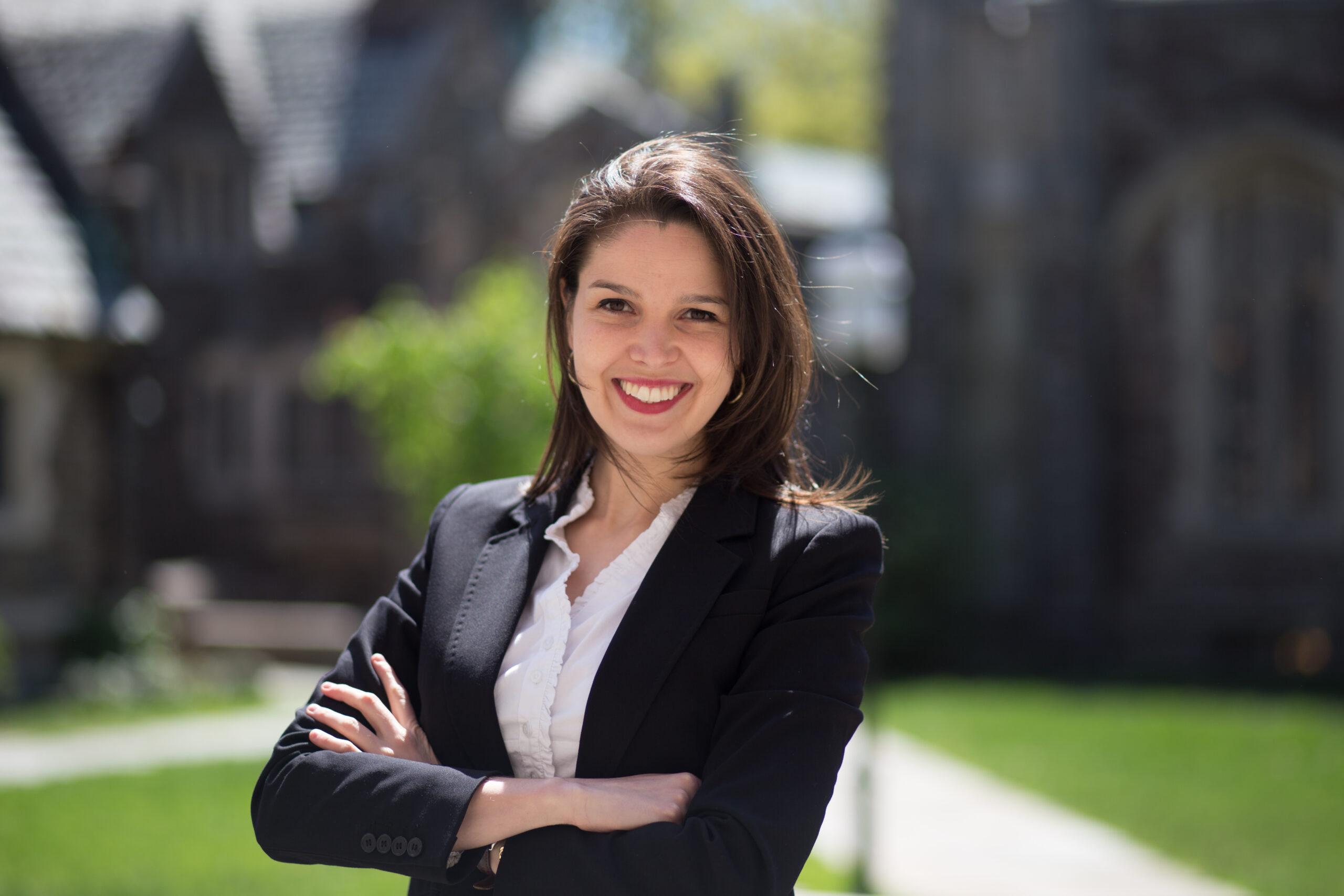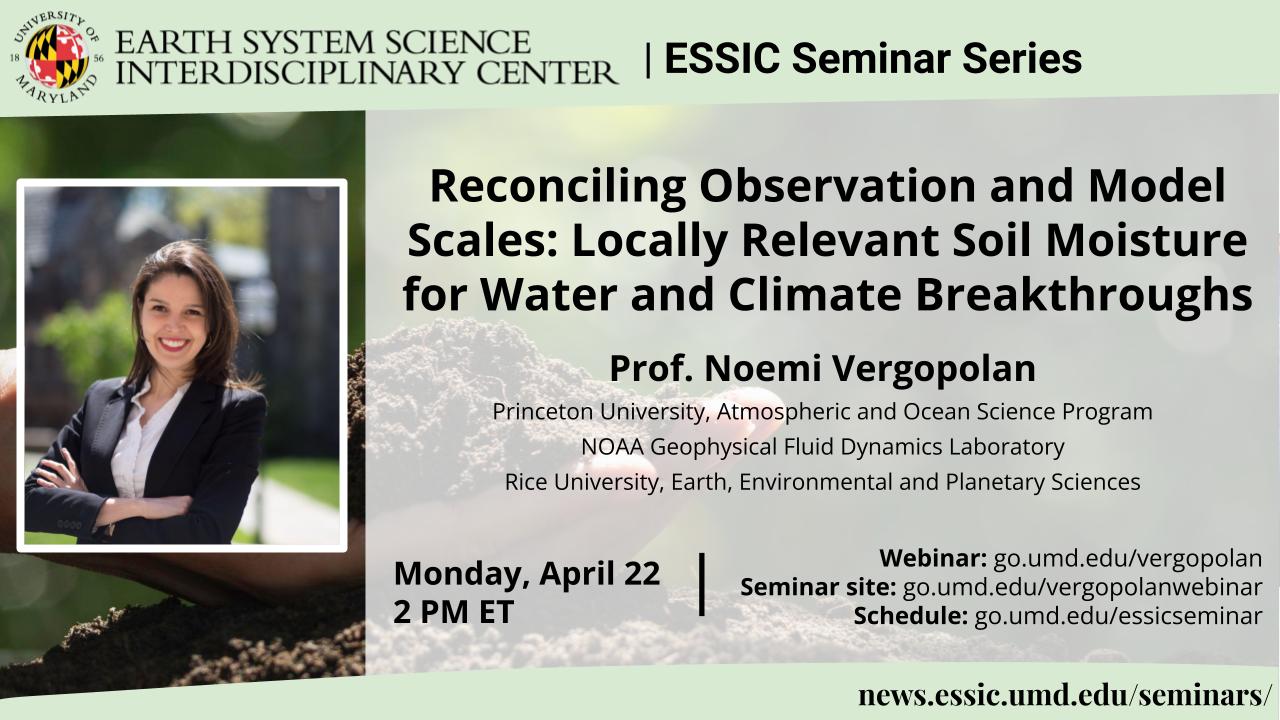
Reconciling Observation and Model Scales: Locally Relevant Soil Moisture for Water and Climate Breakthroughs
Prof. Noemi Vergopolan
Princeton University, Atmospheric and Ocean Science Program
NOAA Geophysical Fluid Dynamics Laboratory
Rice University, Earth, Environmental and Planetary Sciences
Monday April 22, 2024, 2 PM ET
Abstract:
Detailed and accurate soil moisture information is essential to monitor and predict changes in freshwater dynamics, irrigation water demands, hydroclimate extremes (e.g., droughts and floods), natural geohazards (e.g., wildfires and landslides), biogeochemical and ecosystem processes. While in-situ observations can provide precise information locally, networks of sensors are often not widely available. Hyperspectral satellite observations offer global coverage, but measurements can be infrequent or too coarse to capture the local extremes. This observation data gap limits its usage for locally relevant decision-making and policy implementation. To bridge this gap, advances in hyper-resolution land surface and Earth system models (operating at the ~100m to 1km resolution) and the ever-increasing availability of satellite remote sensing, big environmental data, machine learning, and high-performance computing provide a pathway forward.
This presentation highlights advances in monitoring soil moisture by improving land surface models’realism via sub-grid tiling schemes and satellite land data assimilation. These approaches enabled hydrological information at unprecedented scales and over continental domains, such as SMAP-HydroBlocks – the first 30m resolution satellite-based surface soil moisture dataset in the United States. More importantly, it establishes the foundation for understanding, modeling, and predicting soil-water-plant-climate interactions at the spatial scales required for many water, climate, and food security applications. These include, for instance, improved capabilities to model floodplain interactions, detect droughts and their impacts on crop yields, and predict vegetation carbon storage and their interactions with climate at the ~100s meters scale. Reconciling scales and harnessing the ever-increasing potentials of satellite observation and Earth system models will continue to play a critical role in supporting water and climate efforts at scales relevant to stakeholder interventions and policy implementation.
Biosketch:
Dr. Noemi Vergopolan is a computational hydrologist working on solutions for water resources and climate science. Her research aims to aid actionable decision-making by improving hydrological information for monitoring and forecasting hydrological extremes and their impacts at the local scales. To this end, she develops scalable computational approaches for high- resolution hydrological prediction by leveraging advances in satellite remote sensing, land surface modeling, machine learning, data fusion, and high-performance computing.
Dr. Vergopolan holds a Ph.D. in Civil and Environmental Engineering from Princeton University and is currently a visiting researcher at the NOAA Geophysical Fluid Dynamics Laboratory (GFDL), where she is developing the land data assimilation system for the GFDL ESM. In July, Dr. Vergopolan will transition to Rice University as a faculty in the Earth, Environmental, and Planetary Sciences Department.
For her recent contributions to science, Noemi was awarded the 2022 Paul F. Boulos Excellence in Computational Hydrology Award by the American Academy of Environmental Engineers and Scientists and the 2022 AGU Science for Solutions Award for “outstanding contributions to water and food security through advances in hyper-resolution land surface modeling and satellite remote sensing.”
Webinar:
Event site: https://go.umd.edu/vergopolan
Zoom Webinar: https://go.umd.edu/vergopolanwebinar
Zoom Meeting ID: 950 1537 1097
Zoom password: essic
US Toll: +13017158592
Global call-in numbers: https://umd.zoom.us/u/aMElEpvNu
For IT assistance:
Cazzy Medley: cazzy@umd.edu
Resources:
Seminar schedule & archive: https://go.umd.edu/essicseminar
Seminar Google calendar: https://go.umd.edu/essicseminarcalendar
Seminar recordings on Youtube: https://www.youtube.com/user/ESSICUMD


